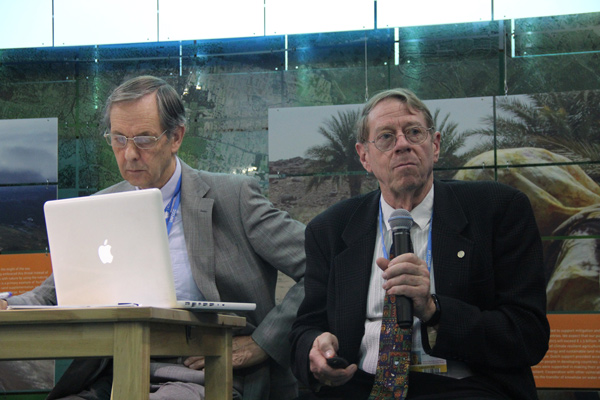The views expressed in our content reflect individual perspectives and do not represent the authoritative views of the Baha'i Faith.
All too often, we see science and religion as antagonistic forces, with little to contribute to each other.
As the debate over climate change has intensified, and the scientific evidence has reached overwhelming levels, it has become increasingly apparent that scientific information alone may be insufficient to motivate the necessary action for the fundamental transformation of human society:
I used to think that top environmental problems were biodiversity loss, ecosystem collapse and climate change. I thought that thirty years of good science could address these problems. I was wrong. The top environmental problems are selfishness, greed and apathy, and to deal with these we need a cultural and spiritual transformation. And we scientists don’t know how to do that. – Gus Speth, co-founder of the Natural Resources Defense Council
Religions and faith-based groups increasingly raise the ethical issues behind the climate change challenge, in complement to the scientific arguments.
You can find one example of this close cooperation between science and religion within the Baha’i community.
Scientific concepts of ecology, environmental responsibility and evolutionary social change are deeply rooted in the Baha’i writings, and the Baha’i International Community has been active on environmental issues at the United Nations and elsewhere for many decades. In parallel, the International Environment Forum, a Baha’i-inspired organization of environmental professionals from 70 countries, has organized international conferences on the spiritual dimensions of, and response to, climate change, as well as on education for sustainable development and lifestyle changes.
The Baha’i International Community represents the worldwide Baha’i community, whose members come from every national, ethnic, religious, cultural, and socio-economic background, representing a cross-section of humanity.

Arthur Dahl, president of the IEF and a retired Deputy Assistant Executive Director of the United Nations Environment Programme (UNEP), presents at COP21.
Active in various global fora, the Baha’i International Community maintains United Nations offices in New York and Geneva, as well as regional offices in Addis Ababa, Brussels, and Jakarta. The Baha’i International Community registered with the UN as an NGO in 1948, and currently has consultative status with the United Nations Economic and Social Council (ECOSOC) and the United Nations Children’s Fund (UNICEF), as well as accreditation with the United Nations Environment Programme (UNEP) and the United Nations Department of Public Information (DPI). The Baha’i International Community collaborates with the UN and its specialized agencies, as well as member states, inter- and non-governmental organizations, academia, and practitioners. The BIC, in their formal statement addressed to the Paris Climate Conference (COP 21) in December of 2015, said:
Anthropogenic climate change is not inevitable; humanity chooses its relationships with the natural world … The current global order has often approached the natural world as a reservoir of material resources to be exploited. The grave consequences of this paradigm have become all too apparent, and more balanced relationships among the peoples of the world and the planet are clearly needed. The question today is how new patterns of action and interaction can best be established, both individually and collectively, through personal choices, social systems, and governing institutions.
With the adoption of the United Nations’ 2030 Agenda for Sustainable Development, including its social, economic and environmental dimensions, momentum for meaningful change has been building. A universal, legally binding agreement on carbon emissions seems within reach for the first time. Yet sustainability is defined as much by human and social factors as ecological ones. Correlation has been found, for example, between inequality and environmental degradation, suggesting that the relationships linking human beings with one another have a direct impact on the physical resources of the planet. The global systems that have left many facing poverty and want, have similarly impoverished the natural environment.
A more balanced attitude toward the environment must therefore address human conditions as consciously as it does natural ones. It must be embodied in social norms and patterns of action characterized by justice and equity. On this foundation can be built an evolving vision of our common future together. And that vision, in turn, stands as a powerful mechanism for mobilizing action around the world and coordinating numerous efforts into mutually-reinforcing lines of action.
The Baha’i approach to the global climate crisis combines a scientific perspective on climate change with the resulting ethical challenges. It questions the dominant materialist society and consumer culture, emphasizing the necessary balance of the material and spiritual dimensions of human life. At the social level, it focuses on the unity of the human race founded on justice and solidarity. It explores the spiritual principles upon which any solution to the climate change problem and the larger challenges facing society must be based, and incites individual reflection and community action. Scenarios of the ever-advancing civilization that can result from a principle-based approach provide a positive focus to counterbalance the negative perspectives for our immediate future that the scientific facts demonstrate only too clearly.
















Comments
Sign in or create an account
Continue with Googleor